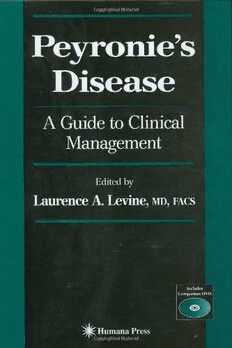
Peyronie’s Disease A Guide to Clinical Management PDF
284 Pages·2006·7.198 MB·English
Most books are stored in the elastic cloud where traffic is expensive. For this reason, we have a limit on daily download.
Preview Peyronie’s Disease A Guide to Clinical Management
Description:
Previously considered rare, Peyronie's disease affects nearly 10% of adult men. Recent advances in wound-healing disorders have substantially increased the understanding of Peyronie's disease and its pathophysiology. In Peyronie's Disease: A Guide to Clinical Management, international authorities review the current nonsurgical and surgical therapeutic options for dealing with this fibrotic disorder. A variety of state-of-the-art research techniques is discussed, including tissue analysis, cell culture of fibroblasts derived from Peyronie's plaques, and animal models that attempt to mimic the in vivo process of tunica albuginea fibrosis while also providing an opportunity for manipulation with novel therapeutic techniques.Although there is no cure for Peyronie's diseases, this text discusses treatments that may result in physical improvement or help to stabilize the scarring process. For those with a more advanced disease, surgical options to correct the deformity in an effort to make the patients functional again are reviewed. Also discussed are the many misconceptions about Peyronie's disease, so that a practicing physician will be able to diagnose, treat, or refer the patient more appropriately. An accompanying DVD reviews the most frequently performed operations, with tips on patient selection and surgical techniques for correction of Peyronie's disease.As the first medical text on the subject, Peyronie's Disease: A Guide to Clinical Management provides an up-to-date summary of the etiology, natural history, and pathophysiology of this disease as well as presents a review of the available medical and surgical treatment options.
See more
The list of books you might like
Most books are stored in the elastic cloud where traffic is expensive. For this reason, we have a limit on daily download.
